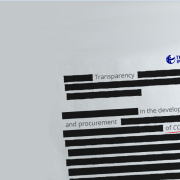|
Getting your Trinity Audio player ready...
|
The report covers about R69-billion of the R147-billion spending for the period from April – when the R500-billion fund was announced by President Cyril Ramaphosa – to the end of July. It has flagged, so far, glaring signs of trouble:
- Exorbitant spending against suppliers when compared to their pre-Covid-19 spending
- Suppliers used for the first time during the Covid-19 period
- Bank account numbers that were different from the details on the Central Supplier Database system
- Payments processed through sundry payments
- Large round payments made to suppliers
- The tax compliance status of some of the large suppliers also came into question.
Poor record-keeping and lack of coordination and information-sharing for projects that run across multiple government institutions meant that already deficient procurement systems were further compromised, said Makwetu. While in some cases errors were the cause for concern for his team, the abuse of the new environment by others also crippled efforts.
“The lack of validation, integration and sharing of data across government platforms resulted in people – including government officials – receiving benefits and grants they were not entitled to. Some applicants could have been unfairly rejected as a result of outdated information on which assessment for eligibility was based.”
The first of government’s Covid-19 relief fund audit reports is out, and if those who are responsible for the fund’s oversight don’t gear up to tighten control measures, the plundering witnessed in the first three months will continue and the emergency efforts will have been in vain. These are the sentiments of Auditor-General Kimi Makwetu, who addressed a media briefing on Wednesday.
Two of the fund’s bulk expenditures were the Unemployment Insurance Fund (UIF) and Sassa. The temporary employer/employee relief scheme (Ters) had spent over R37-billion by July, while Sassa had dispersed R19.6-billion in social grants, which includes the social relief grant of R350 per beneficiary.
The audit, said Makwetu, is performed by multi-disciplinary teams made up of fraud, information technology and sector-specific experts, who support the financial auditors to dig deeper and provide relevant insights on auditees’ risks and operations. “We are auditing payments, procurement, and delivery as they occur and are reporting findings to the accounting officer or authority to enable them to deal with any shortcomings immediately and tighten the controls to prevent a recurrence.”
Stricter oversight is imperative
Poor validation controls have compromised both emergency relief efforts, and neither institution had fraud-proof mechanisms to help avoid abuse. As a result, a high number of Ters payments were flagged by auditors, while around 30 000 beneficiaries of Sassa payments have to be investigated.
On the same day that Makwetu was outlining the work done by his team, news of the suspension of UIF commissioner Tebogo Maruping emerged. Employment and Labour Minister Thulas Nxesi is reported to have placed Maruping on precautionary suspension following the findings of the AG on discrepancies in Ters.
Makwetu stressed that given what has been found to date, preventative action was urgently required. “We do think that, having looked at all of that has gone through the systems and monies that have been dispersed already, that this report needs to find the direct attention of all oversight bodies in government,” he said.
“Whether it’s portfolio committees, whether it’s executive committees, whether it’s many of those institutions that play an oversight role, they need to take a keen interest in what is contained in this report, because this report gives them a baseline of where we are now, but it doesn’t walk away from all the things that have gone wrong.”
They still need to be processed from an oversight point of view, he added, but it requires the effort of all of those that are charged with oversight to put all of their preventative measures in place to make sure that the remaining part of this budget does not go through similar fault lines.
“Designing and implementing controls that prevent fraud, errors and abuse are an investment that pays off when an institution is called upon to deal with a crisis as we are now experiencing.
“It is by far a better approach than having to deal with lengthy and costly investigations and a loss of resources and public confidence. Even in the midst of a crisis, transparency and accountability for government spending to the benefit of citizens cannot take a back seat.”
The next report is expected to come out in November, Makwetu’s last month in office, and the last in the first quarter of 2021.








